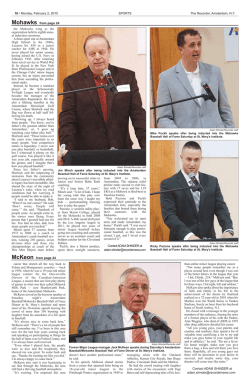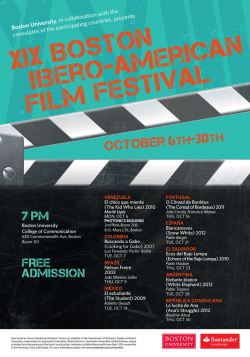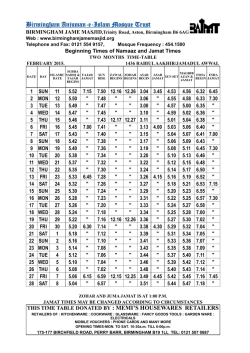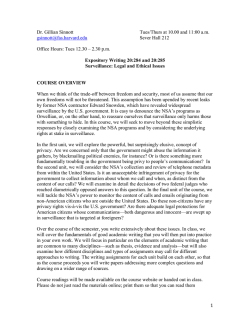
history 362 baseball and american history unc chapel hill - H-Net
HISTORY 362 BASEBALL AND AMERICAN HISTORY UNC CHAPEL HILL SPRING 2015 Dr. Matthew Andrews Office: Hamilton 515 Office Hours: M 12-2; Tu 12:30-1:30; W 1-3; Th 12:30-1:30; F 1-3 Email: [email protected] Course graders and their email addresses: Greg Mole – [email protected] Laura Sims – [email protected] Baseball seems to have been invented solely for the purpose of explaining all other things in life. - Roger Angell COURSE THEMES The story of baseball is the story of modern America. To study the history of the game is to study the story of immigrants and the native-born pursuing the “American Dream.” It is to explore the rise of big business and to learn how American laborers coped with the new urban industrial order. The story of baseball is the story of racial prejudice and segregation. It is also the story of desegregation and integration (there is a difference between those last two terms, a difference we will consider). Baseball can teach us about men and women and the evolving ideas about their “place” in public life. We can learn about patriotism and competing definitions of what it means to be an American. To study the game of baseball is to explore the hold of myth, memory, and nostalgia on American culture. These are among the many things the story of baseball can teach us. This is a course about baseball. But more to the point, it is an American History course. Though we will hear, read, and watch many entertaining accounts of great teams, great players, and thrilling games—tales of home runs hit, shut outs pitched, and pennant races won—as historians our task is to make connections between baseball and the larger themes in American history listed above. I repeat for emphasis—our goal this semester is to make links between the story of baseball and the larger story of American history. How well you do in making these links will determine how well you do in this course. COURSE READINGS Lawrence S. Ritter, The Glory of Their Times: The Story of the Early Days of Baseball Told by the Men Who Played It Eric Rolfe Greenberg, The Celebrant: A Novel Jules Tygiel, Baseball’s Great Experiment: Jackie Robinson and His Legacy David Halberstam, October 1964 *or* Jonathan Mahler, Ladies and Gentlemen, The Bronx is Burning Bernard Malamud, The Natural Documents on Course Sakai Page “Reading” and “Discussing” It is important to keep up with the reading in this course. You will need to be selfdirected as we will not be meeting for weekly recitations. In this syllabus I have marked some documents as “Read” and some as “Discuss.” If a document is marked as “Read” we will not spend time discussing the document in class, though I may refer to the document in my lecture. But you are required to read the document and you should consider using the document, if relevant, in your writing assignments. Any document marked “Discuss” will be discussed in class—that is, I intend to ask you questions and have a conversation about the document in lecture (you should consider using these documents in your writing assignments, as well). For documents marked “Discuss,” then, carefully read the assigned piece(s) before lecture and always bring the material for reference. You can access the documents on the Course Sakai Page by clicking the “Resources” tab on the left side of the page. I have listed the documents in the order that we will be reading and discussing them. There is no traditional “textbook” for this course. Instead, the lectures will be your chief source of information—so coming to class and taking notes is critical. Your task this semester is to take the information I have presented in lecture, fuse it with the ideas presented in the readings, and use these two sources to answer the questions that I will pose about American history. Note: If you have very little knowledge of American history you may find it helpful to consult an American history textbook, especially one that focuses on the United States after the Civil War. If you have questions about American history (not to mention questions about baseball history), you can also come and talk to me during my office hours. ASSIGNMENTS AND GRADES Your course grade will be determined by the quality of your three argument essays (each 5-6 pages) and your in-class final exam. The argument essay prompts will be posted on Sakai and discussed in lecture at least two weeks before each essay is due. We will give you a “final exam study guide” at least two weeks before the final exam. The final exam will consist of a list of identifications, short answers, and essay questions. Keeping good notes throughout this semester will help you immensely when we get to the final exam. Your final grade will be calculated as follows: First Argument Essay Second Argument Essay Third Argument Essay Final Exam 20% 25% 25% 30% ____ 100% Total Policy regarding late work: Argument essays are due at the beginning of class on the day noted in this syllabus. If you must miss class on the due date, your essay should be emailed to your TA before class begins, and then you MUST give your TA a paper copy at our next class meeting. Any essay not handed in during class (or emailed before class begins) will be considered late. An essay will be marked down one full letter grade (ten points) if it late and then five points for every additional day it is late. So, for example, once we leave the lecture hall, if you have not turned in your essay (or emailed your essay before class began) it will be considered late and penalized 10 points. 24 hours later—i.e. at 12:15 p.m. the next day—it will be considered two days late (and thus penalized a total of 15 points). 24 hours later, it will be docked an additional five points, and so on. If you are turning in a late essay, email it to your TA as soon as it is finished so you are not penalized further. And then make sure to bring a paper copy to the next class meeting—if you do not bring a paper copy to the next class meeting the essay will be considered late and the penalties listed above will apply. 2 GRADING SCALE We will keep your grades on the Sakai Gradebook. At the end of the semester you will have a numerical score between 0100. That number will be translated into a letter grade. Here is the grading scale: 100-93: A 92-90: A- 89-87: B+ 86-83: B 82-80: B- 79-77: C+ 76-73: C 72-70: C- 69-67: D+ 66-60 D below 60: F All final grades will be “rounded up.” In other words, if your final mark is 92.50 it will rounded up to a 93 and, thus, an A (a 92.49 would still be an A-). HONORABLE AND COURTEOUS BEHAVIOR THE HONOR CODE: It shall be the responsibility of every student at the University of North Carolina at Chapel Hill to obey and to support the enforcement of the Honor Code, which prohibits lying, cheating, or stealing when these actions involve academic processes or University, student, or academic personnel acting in an official capacity. PLAGIARISM: If the grader of your essay suspects plagiarism and I concur, I will report you to the Honor Court and then I will contact you. All suspected cases of plagiarism are immediately sent to the Honor Court. THE CAMPUS CODE: It shall be the further responsibility of every student to abide by the Campus Code; namely, to conduct oneself so as not to impair the welfare or the educational opportunities of others in the University community. COURTESY DURING CLASSES. It is disruptive to others to arrive late to class or to leave early. If you must do it (which I strongly discourage), please be unobtrusive. Also, please turn off all cell phones. I consider checking your phone and/or texting during class to be the height of DISCOURTESY. LAPTOP COMPUTERS As the semester begins, laptops are allowed in the classroom, but for taking notes only!!! Using laptops for any other reason than taking notes is distracting for others. I know this from personal experience. I have attended lectures given by others and been distracted by students who are emailing, messaging, and surfing the web. I am also persuaded by studies that demonstrate that not only do participants who multitask on a laptop during a lecture score lower on tests compared to those who do not multitask, but (and this is the key) participants who were in view of a multitasking peer also scored lower on test. In other words, using your laptop for anything other than taking notes hurts your peers who want to do well in this course. With all this in mind, the first time I find out that someone is using a laptop for any reason other than note-taking, that will be “strike one.” The second offense will be “strike two.” The third offense, “strike three.” Once we as a class reach “strike three,” laptops will be banned for the rest of the semester for everybody. If this happens (when it happens?) and you have a compelling reason for why you need to use a laptop for note-taking, please come and see me in my office. We will talk about your particular circumstance. I like to think I can sometimes be reasonable. ACADEMIC SUPPORT SERVICES The College of Arts and Sciences has several support programs to assist students. Accessibility Services provides individual support to students with diagnosed learning disabilities (962-7227). The Learning Skills Center offers free instruction in a variety of academic learning strategies (http://learningcenter.unc.edu/, 962-3782, 962-6389). The Writing Center, which fills up quickly, provides free tutorial services (http://www.unc.edu/depts/wcweb/about.html, 962-7710, 962-4060). 3 OFFICE HOURS AND CONTACTING ME I am glad you are in this class and I want you to do well. One of the best ways of doing so is to come and ask questions or just chat with me during office hours. I genuinely enjoy meeting students and learning from and about them. If you cannot make my office hours (they are listed on the front page of this syllabus) please contact me and we will arrange a meeting time convenient to us both. Please note that the instructor reserves to right to make changes to the syllabus, including project due dates and test dates (excluding the officially scheduled final examination), when unforeseen circumstances occur. If this occurs, these changes will be announced as early as possible so that students can adjust their schedules. COURSE SCHEDULE 8 January (Thu) Opening Day 13 January (Tue) Baseball and Myth Discuss: Albert G. Spalding, America’s National Game (1911) [excerpt]. THE NATIONAL PASTIME 15 January (Thu) The Cradle of Baseball Discuss: “A Defense of Baseball as Manly Exercise,” New York Times (1856). To Do: Start reading Lawrence S. Ritter, The Glory of Their Times (1966). 20 January (Tue) Organizing the Game 4 22 January (Thu) Becoming the National Pastime Discuss: Ronald Story, “The Country of the Young: The Meaning of Baseball in Early American Culture,” from John E. Dreifort, ed., Baseball History From Outside the Lines: A Reader (2001). To Do: Start reading Eric Rolfe Greenberg, The Celebrant: A Novel (1983). 27 January (Tue) The Great Baseball Wars To Do: Go over First Argument Essay prompt in class. Discuss: “The Brotherhood Manifesto” and “The NL Responds to the Brotherhood Manifesto” (1889). Read: Lawrence S. Ritter, The Glory of Their Times, chs. 1-7. 29 January (Thu) 1908 – Baseball Comes of Age Read: Eric Rolfe Greenberg, The Celebrant: A Novel, 1-162. Read: Lawrence S. Ritter, The Glory of Their Times, chs. 8-16. BASEBALL AND DEMOCRACY 3 February (Tue) Baseball and 100% Americanism Discuss: H. Addington Bruce, “Baseball and the National Life,” Outlook (1913). Discuss: Eric Rolfe Greenberg, The Celebrant: A Novel, 163-272. 5 February (Thu) Discuss: “Prejudice against an African American Player in Louisville,” Louisville Courier-Journal (1881). 10 February (Tue) To Do: Baseball and Jim Crow “Take Me Out to the Ballgame” – Women and Baseball Hand in First Argument Essay. 12 February (Thu) “The Faith of Fifty Million People” 5 17 February (Tue) Read: Babe Ruth and Modern America Richard Crepeau, “Superstar,” from Baseball: America’s Diamond Mind (1980). 19 February (Thu) A “New Deal” for Baseball (and America) Read: William M. Simons, “The Athlete as Jewish Standard Bearer: Media Images of Hank Greenberg,” from John E. Dreifort, ed., Baseball History From Outside the Lines: A Reader (2001). Read: Lawrence S. Ritter, The Glory of Their Times, chs. 17-26. 24 February (Tue) To Do: Baseball and World War II Start reading Jules Tygiel, Baseball’s Great Experiment: Jackie Robinson and His Legacy (1983). 26 February (Thu) The Negro Leagues To Do: Go over Second Argument Essay prompt in class. Read: Jules Tygiel, Baseball’s Great Experiment: Jackie Robinson and His Legacy, 1-95. BASEBALL AND SOCIAL CHANGE 3 March (Tue) Read: Rickey and Robinson Jules Tygiel, Baseball’s Great Experiment: Jackie Robinson and His Legacy, 91-208. 5 March (Thu) Baseball’s Great Experiment Read: Jules Tygiel, Baseball’s Great Experiment: Jackie Robinson and His Legacy, 211-355. Read: Bill White, Uppity: My Untold Story About the Games People Play (2001) [excerpt]. 10 March (Tue) SPRING BREAK 12 March (Thu) SPRING BREAK 6 17 March (Tue) Read: Baseball and the “American Century” Don DeLillo, “Pafko at the Wall,” Harper’s (1992). 19 March (Thu) To Do: The “Greatest Generation” – Baseball and Nostalgia Hand in Second Argument Essay. To Do: Start reading David Halberstam, October 1964 or Jonathan Mahler, Ladies and Gentlemen, The Bronx is Burning. Your Third Argument Essay (due 14 April) will address issues in the book you select. 24 March (Tue) “Home of the Braves” – Americans on the Move 26 March (Thu) Baseball and “the Sixties” To Do: Go over Third Argument Essay prompt in class. Read: Matthew Frye Jacobson, “‘Richie’ Allen, Whitey’s Ways, and Me: A Political Education in the 1960’s,” from Amy Bass, ed., In the Game: Race, Identity, and Sports in the Twentieth Century (2005). BASEBALL AND MODERN AMERICA 31 March (Tue) Discuss: “Man is a Free Agent” Curt Flood Letter to Bowie Kuhn (1969). 2 April (Thu) The 1970s – Bad News for America 7 April (Tue) Baseball in the Post-Civil Rights Era Discuss: 9 April (Thu) Discuss: Hank Aaron, I Had a Hammer: The Hank Aaron Story (1991) [excerpt]. Populist Baseball Robert Coover, The Universal Baseball Association, Inc., J. Henry Waugh Prop. (1968) [excerpt]. 7 14 April (Tue) Viva Baseball! A Global Game To Do: Hand in Third Argument Essay. To Do: Start reading Bernard Malamud, The Natural (1952). 16 April (Thu) Baseball in the Age of Scandal 21 April (Tue) The Country of Baseball Read: 23 April (Thu) Discuss: 4 May (Mon) Adam Gopnik, “The Rookie,” from Paris to the Moon (2000). Baseball and Myth (Part II) Bernard Malamud, The Natural (1952). FINAL EXAM (noon) “It ain’t over till it’s over” - Yogi Berra 8
© Copyright 2026



